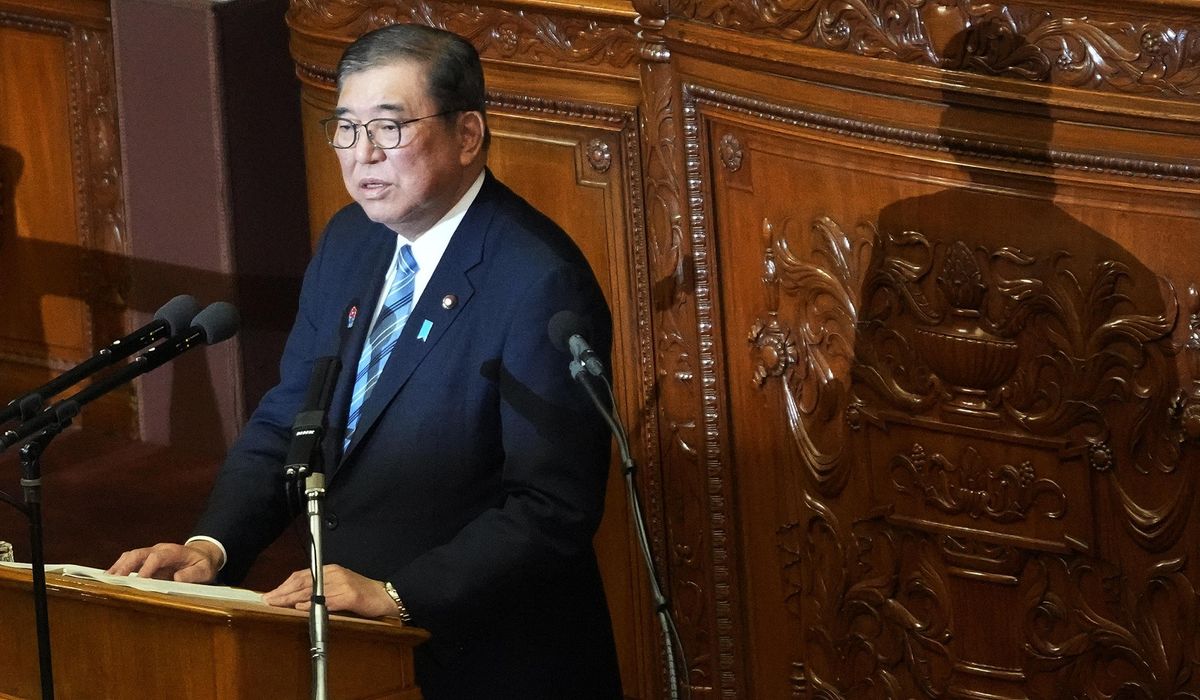


SEOUL, South Korea — Japanese Prime Minister Shigeru Ishiba jetted off to the U.S. Thursday to discuss a changed security and economic landscape in Asia ushered in by the newly inaugurated President Donald Trump.
Mr. Ishiba is the first Asian leader to meet with Mr. Trump in Washington, and the trip appears to be a matter of some urgency: The prime minister’s 12-hour flight from Tokyo left Thursday and Mr. Ishiba is scheduled to be back home by Saturday.
While much of the region is braced for a major policy shift from the departed Biden administration, Mr. Ishiba “intends to build a relationship of trust and cooperation with the new administration of the U.S. and elevate the Japan-U.S. alliance to new heights,” according to Japan’s Ministry of Foreign Affairs,
Similar to the interactions with the first foreign leader Mr. Trump welcomed to the White House, Israeli Prime Minister Benjamin Netanyahu, security issues are likely to dominate the two leaders’ first discussions.
“We need to make necessary efforts to stabilize the Japan-U.S. alliance further,” Mr. Ishiba told parliament Monday.
Japanese media reports suggest that the prime minister will seek public confirmation that the bilateral defense treaty binding Tokyo and Washington covers the Japanese-administered Senkaku Islands, which are also claimed by China.
Beijing has been escalating Coast Guard confrontations in the area. The islands lie north of Japan’s southernmost Ryukyu islands, northeast of Taiwan, and southeast of China’s coast.
If occupied by China, they would offer Beijing a foothold in the critically strategic “First Island Chain” — the formation running from southern Japan to the northern Philippines — that China’s forces would have to break through or bounce if they sought to encircle Taiwan.
September 1 marks the 80th anniversary of the end of World War II, and Mr. Ishiba is expected to invite Mr. Trump to Japan this year in a show of the amity that now binds the two democracies: Japan hosts more U.S. troops than any other foreign country.
During Mr. Trump’s first term in office, he struck up a close personal relationship with then-Prime Minister Shinzo Abe. Mr. Ishiba — an intra-party rival of the late Abe — has been under domestic pressure to establish a similar rapport and concerns that he will fail to do so.
A Japan Times editorial lamented that Mr. Ishiba’s only contact with Mr. Trump so far has been a “perfunctory” five-minute phone call.
Despite the brevity of the trip, Mr. Ishiba is likely to tread carefully with Mr. Trump, amid potential stumbling blocks for the bilateral relationship.
A former defense minister, Mr. Ishiba has informally proposed the concept of an “Asian NATO.” Mr. Trump has signaled contempt for that body, while demanding that U.S. allies spend far more on their defense than they are doing now.
Mr. Ishiba’s predecessor, Fumio Kishida, pledged to boost Japan’s defense budget to Mr. Trump’s 2% of GDP target by 2027, and the formerly pacifist nation’s defense spending has soared in the face of new Chinese assertiveness in the region and Russia’s aggression in Ukraine.
Tokyo is spending particularly big on U.S. cruise and air-defense missiles. Even so, despite these increases, Japan’s defense expenditure in 2024 was just 1.6 percent of GDP.
On the economic front, Japan has long enjoyed substantial trade surpluses with the U.S. — a red flag for Mr. Trump.
Another ticklish issue is Nippon Steel’s bid to acquire financially troubled U.S. Steel. The Biden administration nixed the deal on economic security grounds. That decision shook Japan, the biggest foreign investor in the United States, but Mr. Trump, too, has spoken of maintaining the U.S steelmaker as a national asset.
Japan’s Kyodo News, quoting unnamed officials, expects Mr. Ishiba to propose bilateral industrial alliances in semiconductors and AI, and to expand purchases of U.S. liquefied natural gas.
• Andrew Salmon can be reached at asalmon@washingtontimes.com.
